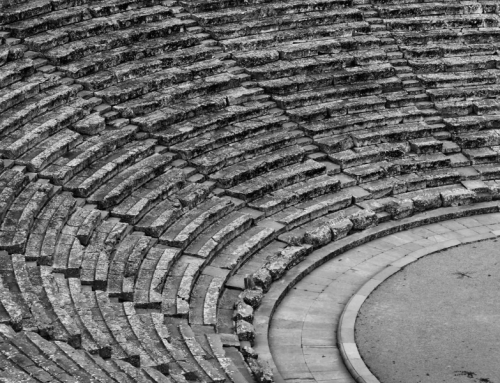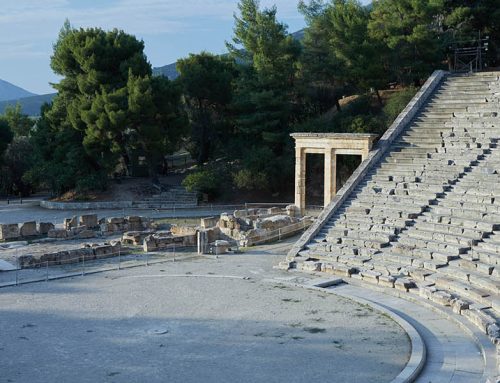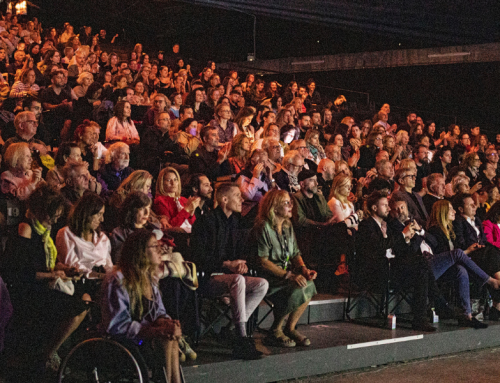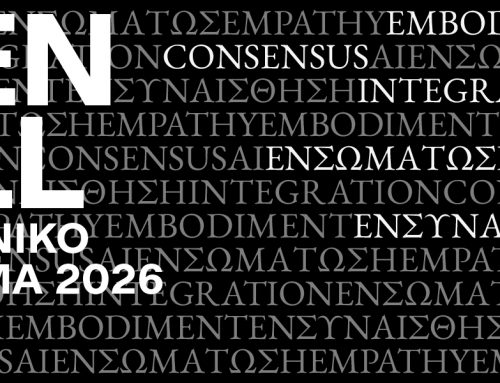Read the Artistic Director’s announcement
A key aim of the Festival’s artistic management is to have the Epidaurus Lyceum—an International Summer School for Ancient Drama—up and running in Epidaurus from 2017. The Lyceum will embrace a range of aesthetic tendencies, schools of thought, methods and research approaches ranging from the most traditional to the most radical. This new educational institution, which will be aimed at young actors and drama school students from around the world, will seek to breathe new life into the region through artistic creation and encounters between people from different cultures. This, our first meeting with the local community, will be dedicated to presenting this ambitious plan and gathering feedback from the local community. The ideas and proposals made at the meeting will then be incorporated into our implementation plan.
In collaboration with the Epidaurus Municipality.
Read the Artistic Director’s announcement
Athens, 30 July 2016
Dear Mr Mayor,
Dear Ladies and Gentlemen,
Dear friends,
We have gathered here today to officially announce and share with you the launch of the planning stage for the Epidaurus Lyceum, a school for young actors and drama students from around the world and a project that is extremely precious to us all.
Since my very first day as Director of the Athens and Epidaurus Festival, I have prioritized both the relating of the artistic process to education and the supporting and promoting of dialogue among the performing arts; the foundation of the Epidaurus Lyceum is inextricably linked to the achievement of both these goals. Because, quite apart from operating as an international ancient drama practice centre located in its birthplace, here in Greece, and serving as an international meeting point for actors, drama teachers, directors, musicians, choreographers, theatre theorists, anthropologists, musicologists and other artists and theorists, this initiative may also lead to a much-needed new approach to ancient tragedy and comedy. Still more, it will foster a creative encounter between tradition and innovation and between ancient and contemporary civilisation–an encounter based on the twin pillars of ancient drama and the actor.
The Epidaurus Lyceum will operate from next summer, the summer of 2017. The students will be hosted in a specially-designed open-air camp, an experience which will enhance the inspiration they glean from the natural environment, give them the experience of communality and promote the values of collaboration, reciprocity and exchange in a context of safety and trust.
At the same time, the artistic creativity and multicultural encounters among young people from different cultures will provide an enormous boost for the area, and we hope to encourage the local community to participate in this educational endeavour. The Epidaurus Lyceum seeks to serve as a source of intellectual regeneration, but also drive development for the whole locality by putting the area in the spotlight internationally.
For us, Epidaurus is extremely precious; not only because of its ancient theatres, but also as a topos—with the geographical location, energy and unique features that favoured the creation of its emblematic theatre. Locating the summer school in the Epidaurus area will liberate drama education from its usual enclosed setting and allow the dynamics of open space to impact on both the educational processes and the students’ experiences—factors both inherently related to the birth and development of ancient drama. For this reason, the bulk of the program will be structured and planned around specially selected open spaces and supplemented by performances of ancient drama held at Epidaurus’ two ancient theatres. Furthermore, classes and events will take the natural environment and the area’s ancient and modern monuments into account and be influenced by them. In other words, as an educational institution, the Epidaurus Lyceum will be totally immersed in its locale, making participation in it an unforgettable experience.
Implementation
We are collaborating closely with the local authorities and other institutions active in the Argolid in relation to the implementation of the Epidaurus Lyceum. We have worked closely from the very start with the Epidaurus Municipality and Mayor Konstantinos Gatzios, with the Head of the Peloponnese Region, Mr Petros Tatoulis, with the Ephorate of Antiquities of the Argolid and its head, Ms Alkistis Papadimitriou, with the Archaeological Service responsible for Epidaurus and Professor Vasilis Almbrinoudakis, with the Community of Epidauros and the Chair of the Municipal Community of Asklepion, Mr Panagiotis Kapsalis, and with the civil engineer from the local Ephorate of Antiquities, Mr Vangelis Kazolias, who oversees all work done in the Epidaurus archaeological site.
The implementation of the programme also involved collaboration with the Department of Theatre Studies at the University of the Peloponnese, which is based in Nafplio, and the Head of department, Ms Alkistis Kontogianni, and to two faculty members: Giannis Leontaris and Christina Zoniou.
Specifically, the Municipality has given us the use of a 2000 square metre area within the forest at the junction between Lygourio and the Ancient Theatre of Epidaurus, which is also conveniently located for the local health centre. The head of the Forest Service, Mr Georgios Politis, has already given his approval for this land.
The Lyceum’s workshops will be held in specially designed spaces within the camp, but also near monuments and in pine woods and groves in the surrounding area. Other locations, such as school facilities in Ancient and New Epidaurus, the High School in Lygourio, the school gym and hall and the precincts of historical churches will also be used for the summer school.
The small theatre of Epidaurus will also be made use of in a variety of ways, serving as one of the main venues for Lyceum workshops, lectures and presentations. As the Lyceum’s amphitheatre, the theatre will also be used for public conferences, symposia and performances (theatre, music, dance) stemming from the Lyceum’s activities that will be open to the public.
Finally, we are collaborating with Heilbronn University (Germany) and Prof. Sebastian Kaiser, whose research team is drawing up a study into alternative modes of touristic, economic and cultural development with a view to achieving development of the best possible sort for the greater Argolid region.
Schedule
The Epidaurus Lyceum will operate over two 15-day periods. For 2017, the first period will start on 22 June and end on 6 July; the second will run from July 10 to July 24. The aim is for the Lyceum to coincide with the Festival so the artistic program of the latter and the educational program of the former can complement and enhance each other—for example, Lyceum participants can attend performances and/or rehearsals, meet the artists etc.
Who is the Lyceum aimed at?
The Epidaurus Lyceum is aimed at drama school students and young actors. In the near future, we aim to also include young directors, theatre theorists, composers, choreographers, dancers, drama educators and others involved in the production of ancient drama. The Lyceum may also be relevant to students of set, costume and lighting design, future producers and young people keen on acquiring experience in cultural management.
Students
There will be up to 150 places available for each of the two fortnightly periods. The Festival will collaborate closely with drama schools, universities and artistic organisations around the world in selecting participants; this procedure is already underway.
Τhe Hellenic Festival’s Department of Educational Programs has joined forces with these organisation to select participants based on criteria set by the Lyceum and taking into account possible sponsorship schemes—a common practice internationally. Collaborating with acclaimed schools and universities will secure participants’ level of competence as well as promoting the Festival’s international exchanges and research.
Teaching faculty—Philosophy
High quality tuition from outstanding artists from Greece and abroad with their own personal interpretation of ancient drama, as well as classes relating to the body, movement, music and song will be provided every year both by artists taking part in that year’s Epidaurus Festival and tutors drawn from participating institutions and schools.
Every period will consist of 170 hours of instruction. Eight to ten main workshops led by selected teachers (one for each workshop) will constitute compulsory modules, and these will be supplemented by shorter elective workshops led by additional teachers. The program will also be enriched by lectures, walks and other events, some of which will be shared with the local community and the public at large. It is one of our primary goals to collaborated with international figures who have contributed to ancient drama research in order to expose the Lyceum’s students to as full a range as possible of the experimentation taking place on the international scene through practice but also through organised presentations sharing events and homages. Given our intercultural perspective on ancient drama, we also intend to organise events dedicated to traditional Eastern forms of theatre such as the theatres of China, Japan and India.
The faculty encourage experimentation through practice but also through organised presentations sharing events and homages. Given our intercultural perspective on ancient drama, we also intend to organise events dedicated to traditional Eastern forms of theatre such as the theatres of China, Japan and India.
At the very heart of the Epidaurus Lyceum philosophy is our desire to connect the educational process with the works of ancient drama performed at Epidaurus. The Little Theatre of Ancient Epidaurus will be oriented towards a repertoire linked directly to the classes taught at the Lyceum with a focus on subjects relating to early forms of theatre in Greece, folklore and folk traditions, circle dances, traditional music and performances of music influenced by tradition, art inspired by ancient drama and work that in some way connects ancient drama with our cultural roots.
From 2017 on, the works staged at the Ancient Theatre of Epidaurus will relate to a theme selected for that year. In turn, the chosen theme will inform the content of the classes at the Lyceum. The topic for 2017 will be “The descent of the Other”, a subject which relates to the dilemmas facing Europe today and which encourages a reappraisal of the political theatre of antiquity in the light of current global turbulence. We believe that the concept of the Other/Foreign has the potential to generate an important dialogue between ancient comedy/tragedy and the present day, both through the ancient texts and their staging in the ancient theatre and through the material that our international participants–companies, artists and students–bring to the Lyceum.
We believe that the Epidaurus Lyceum initiative complements and completes the Festival’s image at this historic juncture at which artists and citizens realise that, in a time of crisis like the present, we have to unite if we want both to move forward and to re-address the significance of Greek culture.
We believe that this international meeting point for young artists in the context of an educational initiative and a thorough understanding of institutions like Democracy—an institution closely related to the birth of ancient drama—will provide new hope for Greece as well as for the upcoming generation of theatre professionals.
Vaggelis Theodoropoulos







